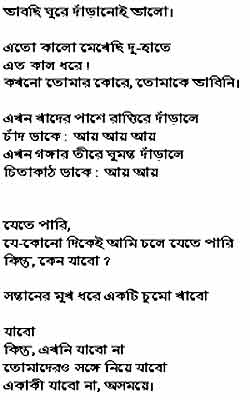 Shakti Chattopadhyay (November 25, 1934 - March 23, 1995) is associated with the generation of poets of the 1960s though he started his literary career in the 1950s. He is known for his bohemian lifestyle. His first collection of poems is known as `He prem he noishobdo`. It came out in 1962. It was written at Chaibasa in Singhbhum district of Bihar. His love life changed him to one of the best lyric poets after Rabindranath Tagore. He has written around two thousand five hundred poems.
Shakti Chattopadhyay (November 25, 1934 - March 23, 1995) is associated with the generation of poets of the 1960s though he started his literary career in the 1950s. He is known for his bohemian lifestyle. His first collection of poems is known as `He prem he noishobdo`. It came out in 1962. It was written at Chaibasa in Singhbhum district of Bihar. His love life changed him to one of the best lyric poets after Rabindranath Tagore. He has written around two thousand five hundred poems.
He still remains one of the most famous poets of his generation. He was the leader of the Hungry generation movement that changed the track of Bengali poetry. He was also one of the instrumental figures in the influential Krittibash magazine. He received the Sahitya Akademi Award for `Jete Pari Kintu Kˆno Jabo` in 1983. He died on March 23, 1995.
He has a sensational popularity among the modern Bengali poetry lovers. Some of his collections are: `He prem he noishshobdo`, `Dhormeo achho jirafeo achho`, `Shonar machhi khun korechhi`, `Hemonter oronne ami postmen`, `Parer kantha matir bari`, `Choturdoshpodi kobitaboli`, `Probhu noshto hoe jai`, `Shukhe achhi`, `Ishshor thaken jole`, `Ostrer gourobhin eka`, `Jolonto rumal`, `Chhinno Bichhinno`, `Shundor ekhane noe`, `Kobitar tulo ore`, `Ami chhire feli chhondo tontujal`, `Hemonto jekhane thake`, `Ae ami je pathore` and `Jete pari kintu keno jabo`.
This article is a stub. You can enrich by adding more information to it. Send your Write Up to content@indianetzone.com













